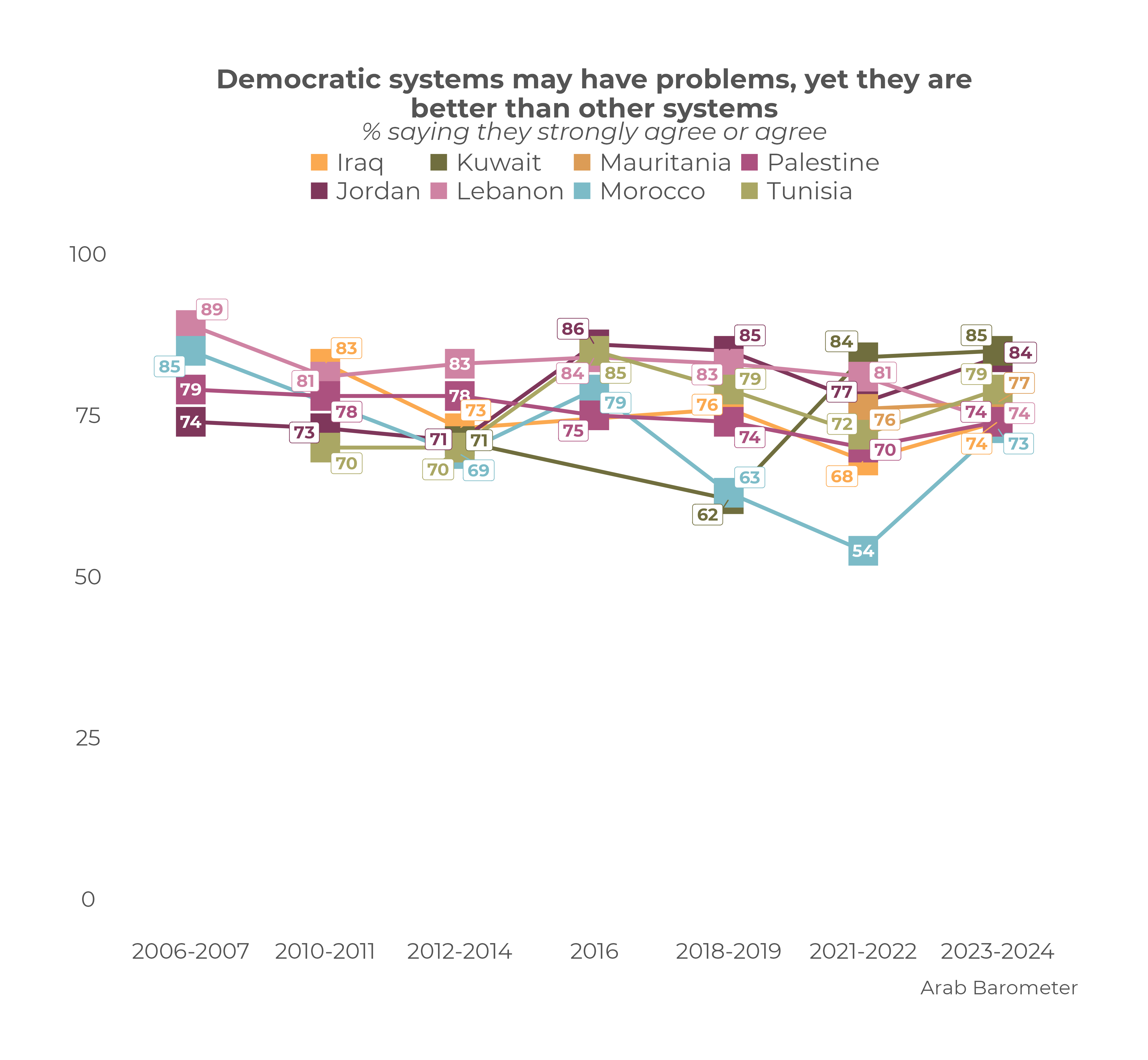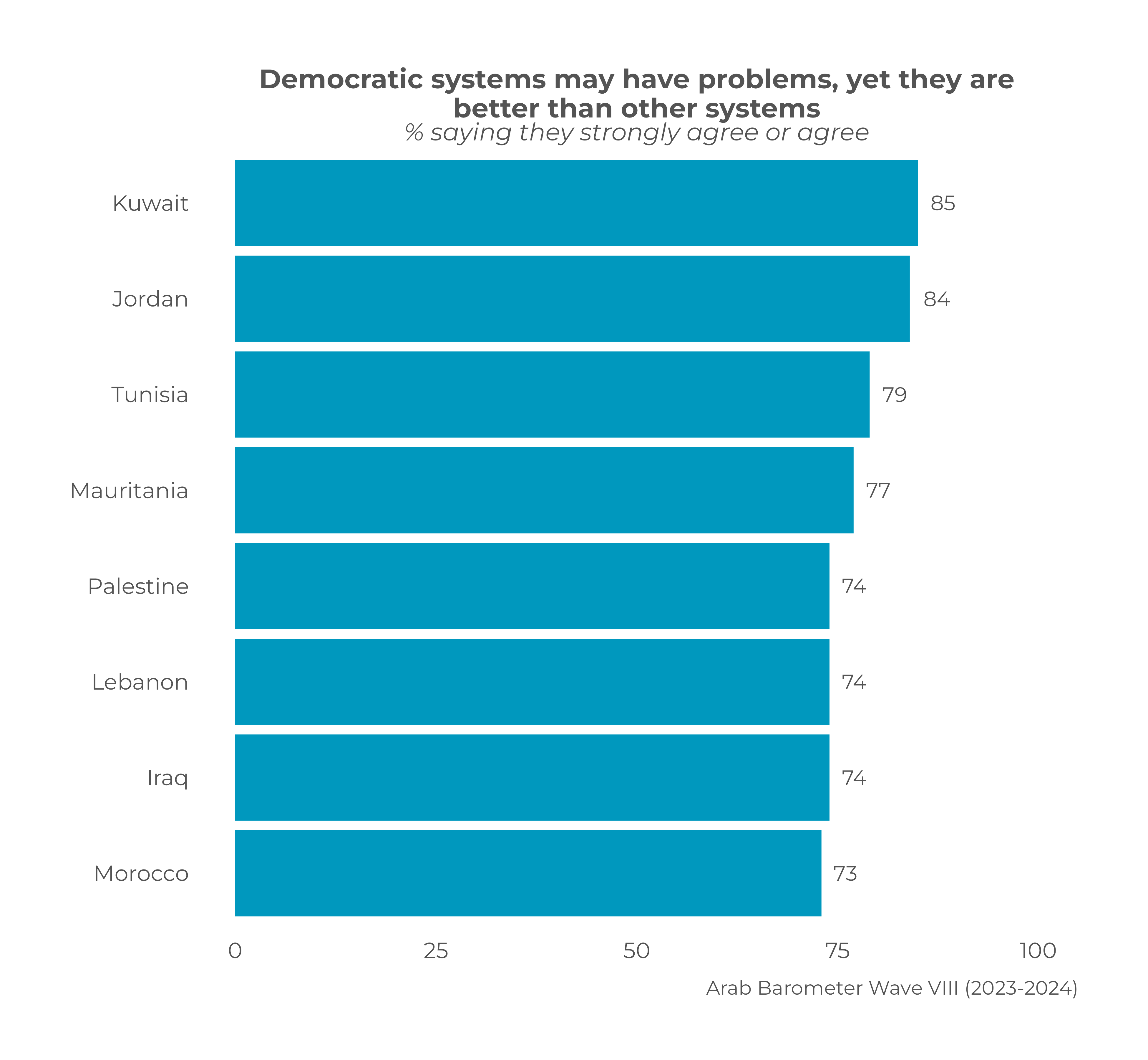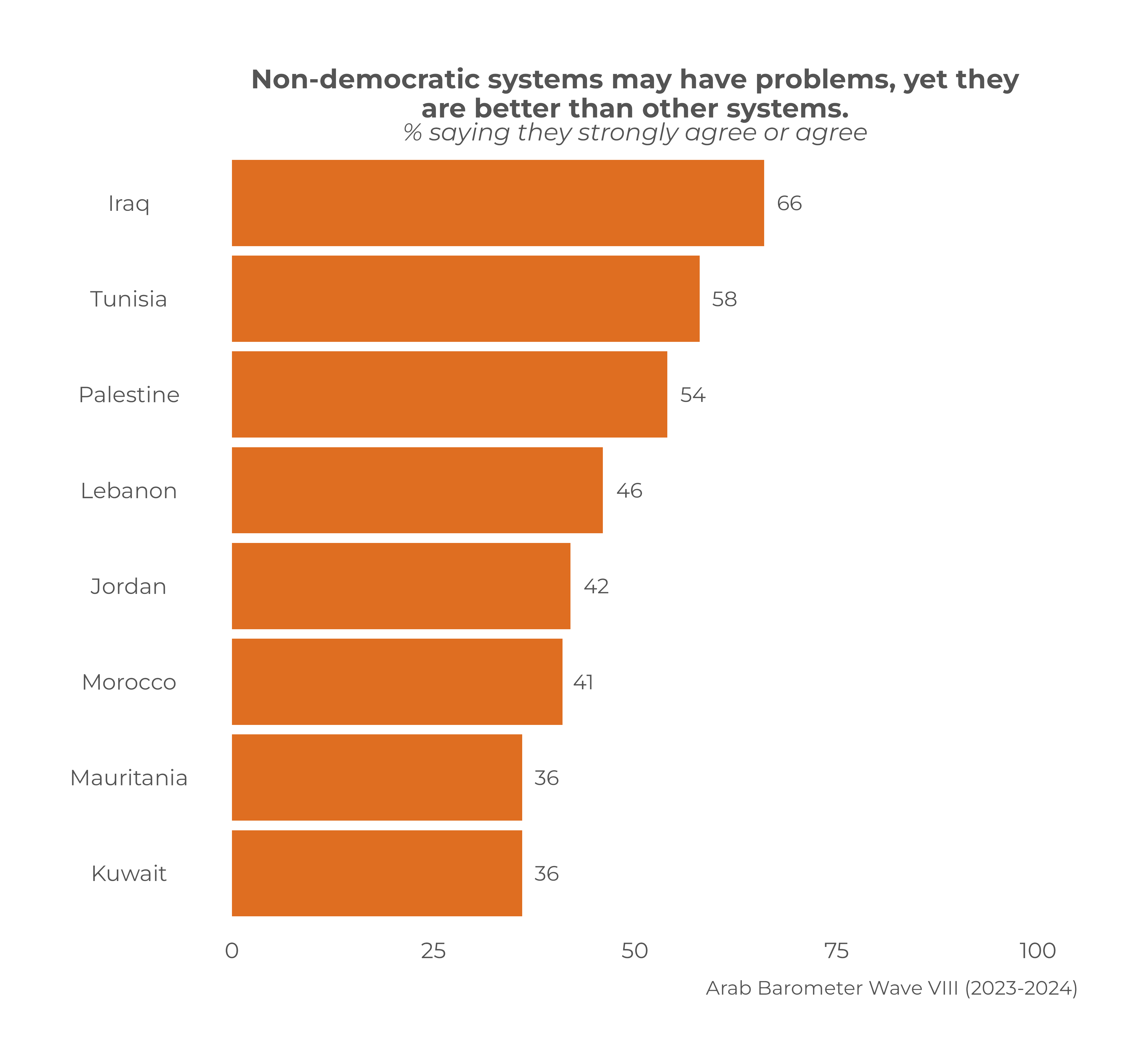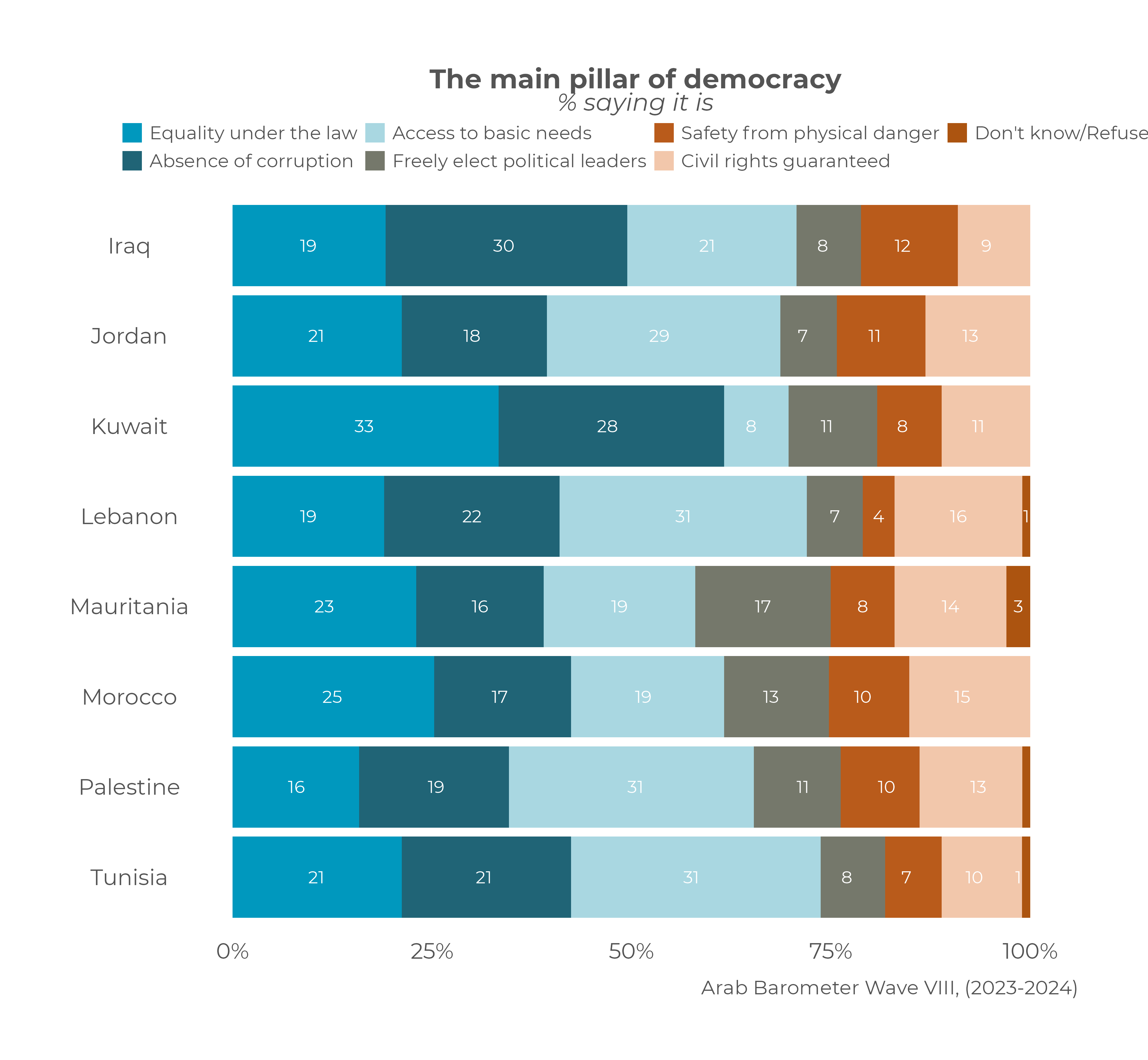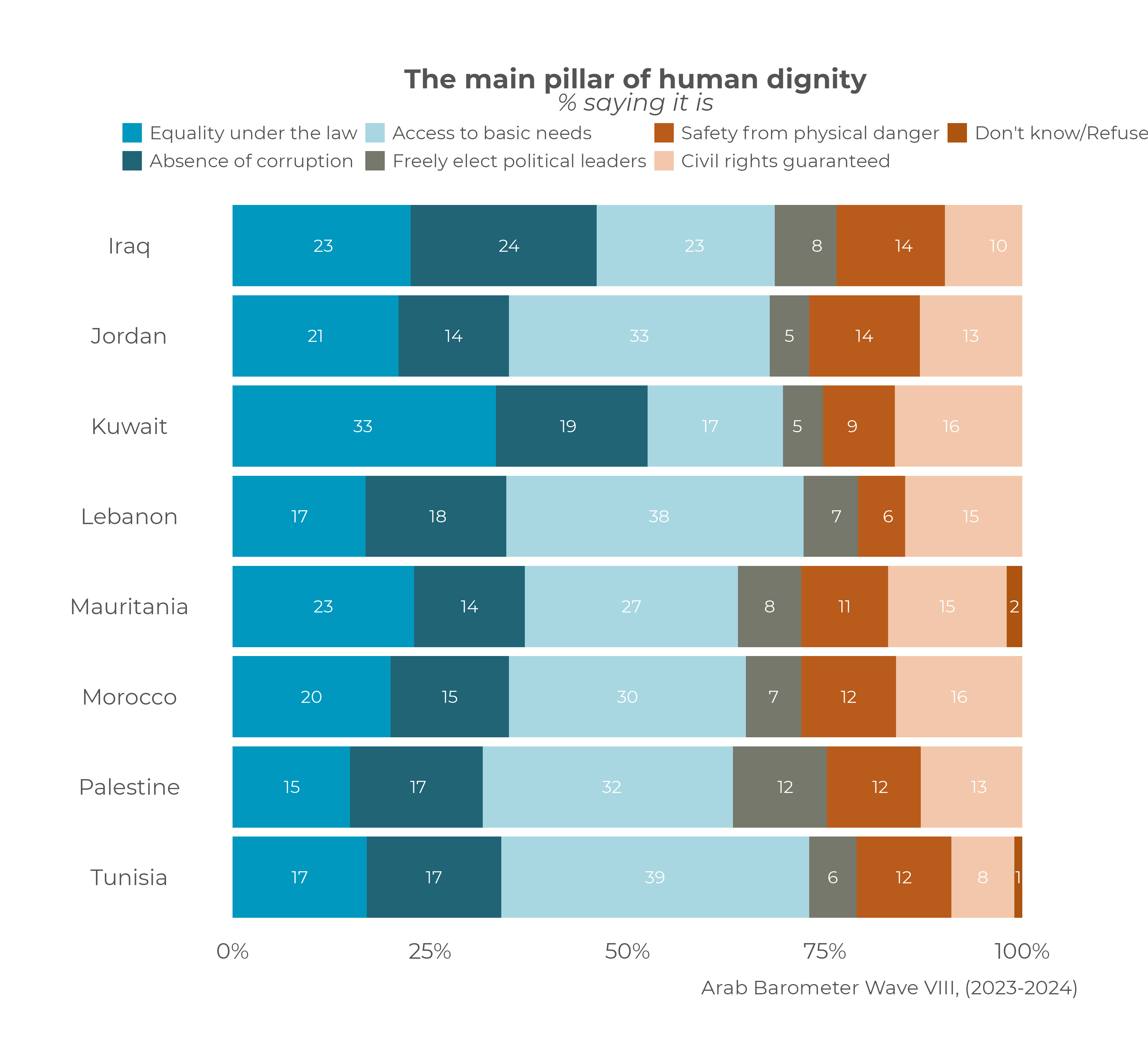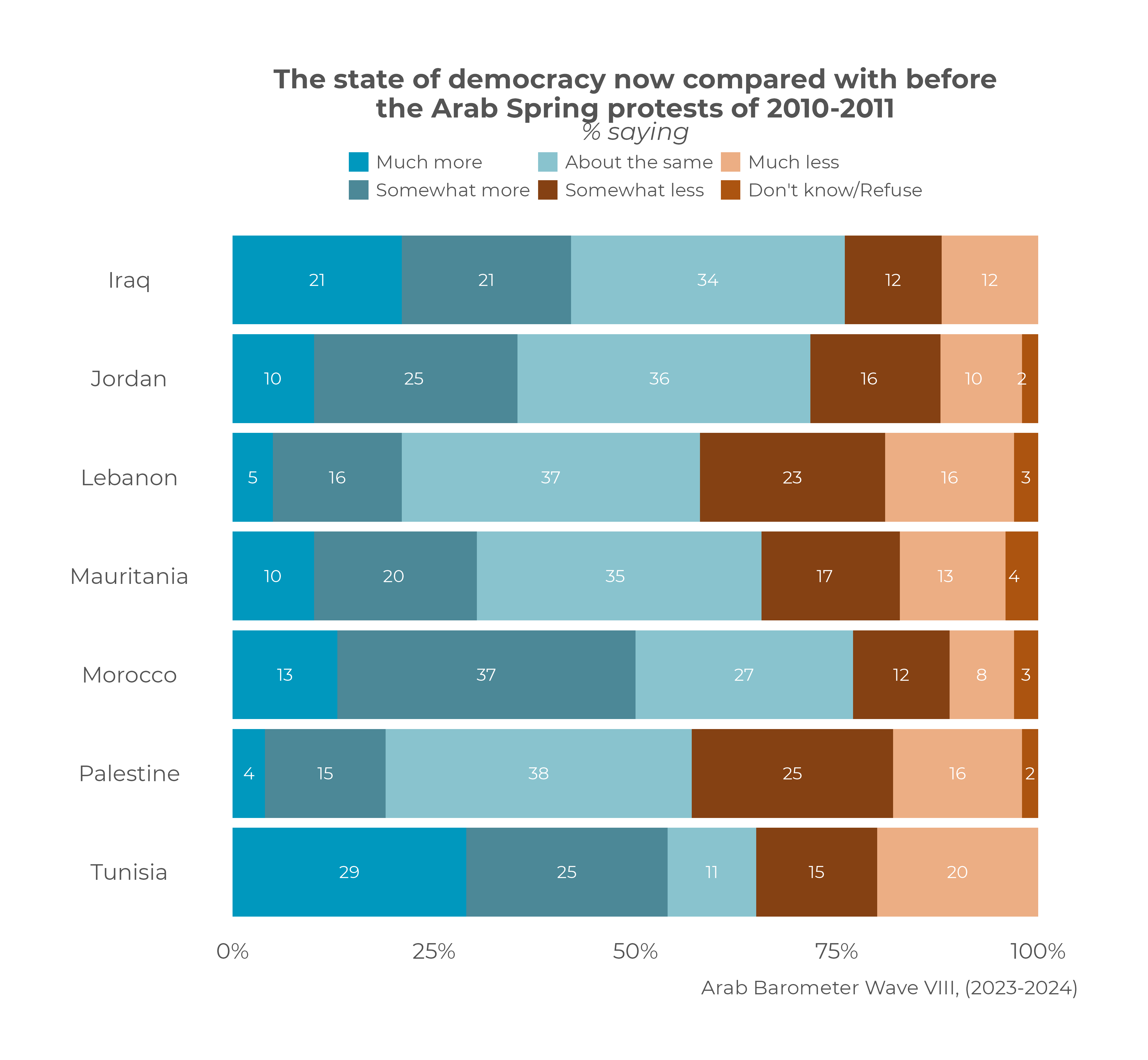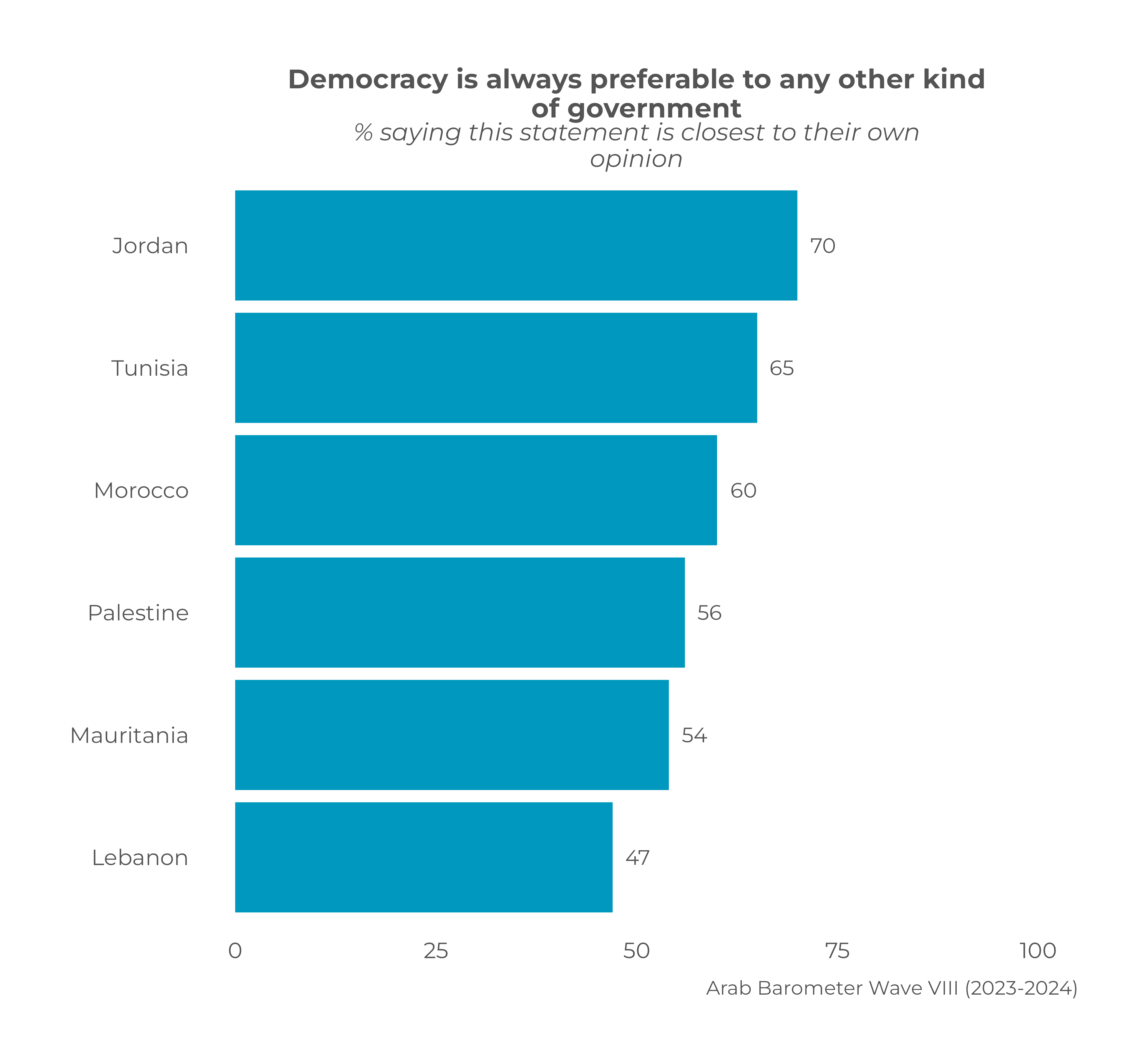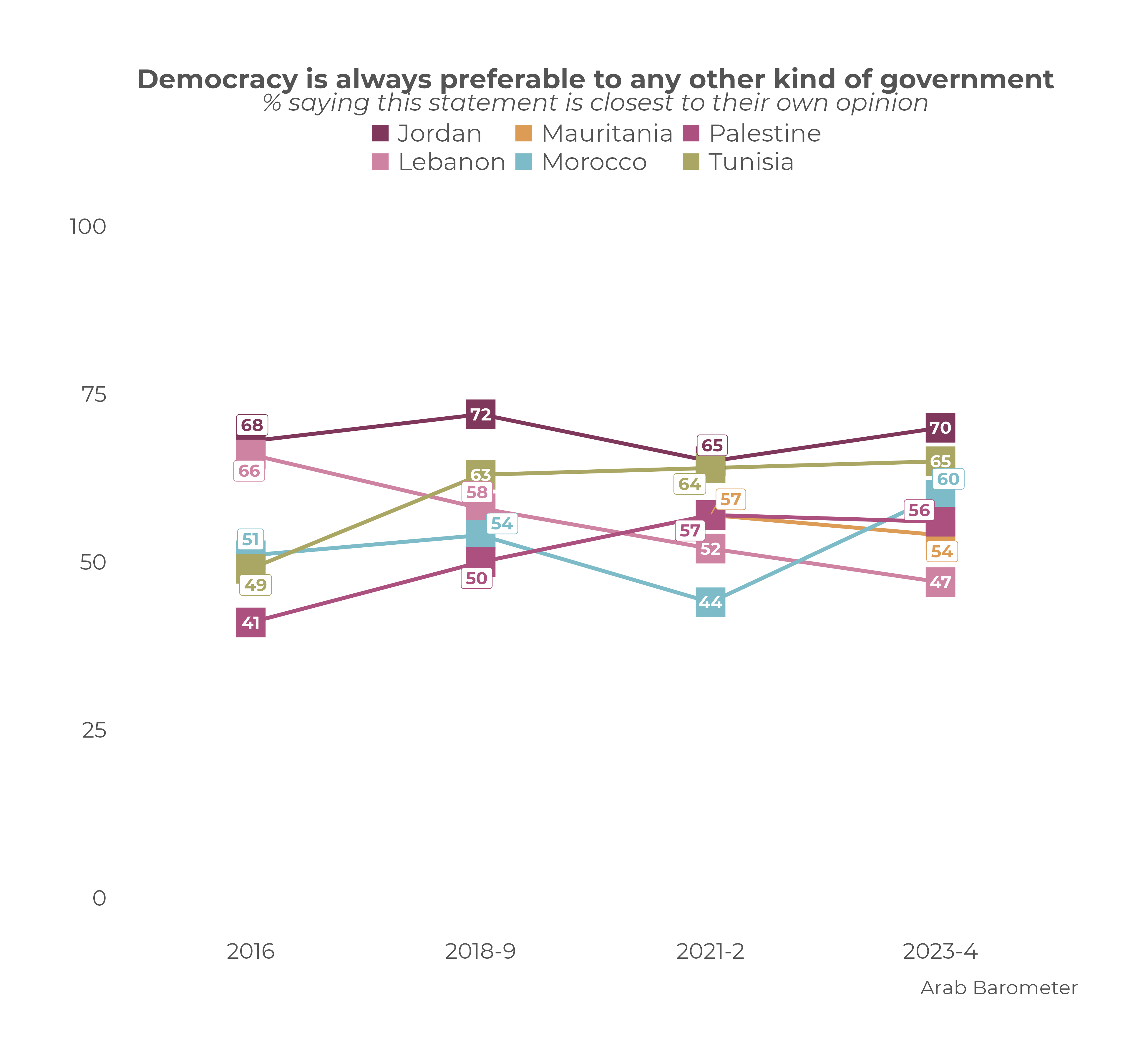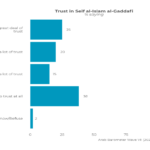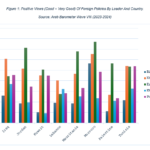For Immediate Release
**Please credit Arab Barometer**
Across the Middle East and North Africa, citizens continue to prefer democracy—but this preference is not focused on elections alone. New data from Arab Barometer show that the reason people effectively support democracy is the belief that it will translate into dignity, including bringing political equality, economic security, and personal safety.
In a detailed analysis across eight countries, the survey reveals that publics across MENA define democracy more by the outcomes it delivers than the procedures it follows. They want governments that ensure justice, meet basic needs, and protect rights to a greater extent than ensuring free and fair elections.
At the same time, frustration is growing. Many associate democracy with poor economic performance and ineffective governance. And while non-democratic regimes are viewed even more critically, perceptions of countries like China—perceived as nearly as democratic as the U.S. by many MENA publics—suggest that strong development records shape democratic legitimacy more than elections do.
Why it matters
Understanding how people in MENA conceptualize democracy is essential for policymakers, donors, and reform advocates. To be seen as legitimate, systems must deliver real results—not just hold routine elections.
About the Survey
These findings draw on eight nationally representative surveys conducted across the region as part of Arab Barometer’s Wave VIII (2023–2024), based on over 15,000 face-to-face interviews. The margin of error is ±3 points or less in each country.
Note: Fieldwork in Palestine was completed on October 6, 2023.
📊 Key Findings
Views on Democratic vs Non-Democratic Systems
1. Democracy remains the most preferred system across the region, though commitment to it as the only viable system varies.
- In every country surveyed, at least 73% say democracy is the best form of government. Support is highest in Kuwait (85%), Jordan (84%), Tunisia (79%), and Mauritania (77%), and slightly lower—but still strong—in Palestine, Lebanon, Iraq (all 74%), and Morocco (73%).
- Since 2021, support for democracy as the best system has risen significantly in Morocco (+19 points), Jordan and Tunisia (+7 points), and Iraq (+6 points), but declined in Lebanon (–7 points).
- However, exclusive commitment—believing democracy is the only viable system— has not increased to the same extent. It has risen in Morocco (+16 points) and Jordan (+5 points) but declined in Lebanon (–5 points). However, the longer term trend shows an increase with the share saying democracy is the only viable system rising by double digits in Palestine and Tunisia since 2016, although it has fallen by nearly 20 points in Lebanon.
2. Skepticism about democracy’s ability to deliver is growing, driven by economic and governance concerns.
- Half or more in five countries associate democracy with weak economic performance: Iraq (76%), Tunisia (73%), Palestine (58%), Lebanon (53%), and Jordan (50%). Although concerns have lessened since 2022 in Mauritania (–12 points), Kuwait (–10 points), Morocco (–7 points), Jordan (–7 points), and Palestine (–5 points).
- Views that democracy is indecisive peaked in 2021–2022 but have since declined in Kuwait (–10 points), Lebanon (–7 points), Mauritania (–7 points), and Morocco (–5 points), while rising slightly in Tunisia (+6 points) and Iraq (+5 points). Still, majorities hold this view in five countries — Iraq (76%), Tunisia (73%), Palestine (58%), Jordan (54%), and Lebanon (53%).
- Perceptions that democracy fails to maintain order declined in Lebanon (–7 points), Kuwait (–6 points), and Mauritania (–5 points) since 2021-2022, remained stable in Jordan and Morocco, and rose slightly in Iraq and Palestine (+4 points each).
3. Non-democratic systems are broadly viewed as ineffective and linked to poor governance.
- Majorities in all eight countries say non-democratic regimes perform poorly economically. The highest is in Iraq (73%), Jordan (72%), and Tunisia (71%).
- At least half in every country agree that non-democratic systems are indecisive, reaching 74% in Jordan and 72% in Iraq.
- Majorities also associate non-democracy with instability, ranging from 71% in Jordan to 53% in Kuwait.
- In five countries fewer than half favor non-democracy over other systems, including just 36% in Kuwait and Mauritania. Support is slightly higher in Morocco (41%), Jordan (42%), and Lebanon (46%), and a majority in Palestine (54%), Tunisia (58%), and Iraq (66%) hold this view.
4. Democracy is favored over non-democracy—even amid discontent.
In every country, more people say democracy is preferable to non-democratic systems. The preference gap is widest in Kuwait (+49 points), Jordan (+42 points), and Mauritania (+41 points). Even in Iraq and Tunisia—where support for non-democracy is highest—democracy still leads by eight points.
Democracy and Dignity: What Arab Citizens Really Expect
What does democracy mean to people in MENA? To answer this, Arab Barometer conducted an experiment across eight countries, asking half of respondents about democracy and half about dignity (karama) using the same set of attributes—allowing new insight into how the two concepts intersect.
1. Democracy is defined as a pathway to dignity rather than elections.
- In all countries surveyed, citizens associate both democracy and dignity with tangible outcomes—prioritizing political equality, basic rights, economic security and personal security over electoral procedures. This strong overlap suggests democracy is widely seen not just as a system of elections, but as a means to achieve personal dignity.
- In 7 of 8 countries, the same core attribute—either equality under the law or access to basic necessities— ranks as the top priority for both democracy and dignity. In Kuwait, Jordan, and Mauritania, equality under the law is most commonly seen as a very essential pillar of both concepts, whereas in Tunisia, Iraq, Palestine, and Lebanon, the provision of basic needs holds that distinction.
- Free and fair elections consistently rank lowest as an essential pillar of both democracy and dignity in all countries except Mauritania, underscoring that electoral processes are not as important as tangible outcomes. Still, clear majorities across MENA consider elections an important part of democratic governance.
- Despite meaningful electoral changes over the past two decades, publics in Tunisia, Iraq, Lebanon, and Palestine are at least 10 points more likely to prioritize basic necessities over free and fair elections as being very essential to democracy.
2. Public perceptions of democracy and dignity closely align.
- In nearly all countries surveyed, the share naming legal equality, civil rights, free and fair elections, absence of corruption, basic needs, or safety as themain pillar of democracy closely matches those naming it for dignity—often within the margin of error (five percentage points or less). Some variation appears on access to basic needs, which is more strongly linked to dignity in some countries.
- These patterns suggest that many in MENA view democracy as a means to achieve personal dignity and tangible benefits, not just a system of elections.
Democracy in Practice: Judged by What It Delivers
Across MENA, citizens assess democracy not just by elections, but by whether governments deliver dignity, justice, and economic well-being—at home and abroad.
1. Germany and the U.S. are seen as democratic—but ratings vary.
- On a scale of 0-10, Germany receives higher average democracy scores across most countries, ranging from 5.7 in Jordan to 8.6 in Morocco and 8.2 in Mauritania.
- The U.S. earns slightly lower average scores, from 5.1 in Jordan up to 8.7 in Morocco and 8.4 in Mauritania.
- Despite this, more citizens rate the U.S. as a full democracy (10 out of 10), with 45% in Mauritania and 39% in Iraq and Morocco, compared to 36%, 34%, and 32% respectively for Germany.
- In Jordan and Palestine, only about 14% rate the U.S. as fully democratic, while even fewer rate Germany as such (10% and 12%).
2. China is seen as nearly as democratic as the U.S.—despite lacking elections.
- In six of eight countries, China’s average democracy score is within one point of the U.S.
- In Tunisia and Jordan, China is rated moredemocratic than the U.S.—suggesting economic performance strongly shapes perceptions of MENA publics.
3. Citizens are skeptical of democracy at home.
- Only in Kuwait do more than a quarter (28%) say their country is a full democracy.
- Elsewhere, self-assessed democracy remains modest with an average score of 3.3 in Palestine, 4.4 in Iraq, and between five and six in most other countries.
4. Political stances influence democratic legitimacy.
- Tunisia’s rating of the U.S. fell after October 7, 2023, amid American support for Israel, while its own score rose—likely reflecting President Saïed’s vocal support for Gaza and criticism of the Israeli military campaign.
- In MENA, taking a stand for what publics perceive as justice plays a critical role in shaping understandings of democracy.
5. Few see progress since the Arab uprisings.
- In five of seven countries, pluralities say the level of democracy is “about the same” as before 2011—including in Iraq, Jordan, Lebanon, Mauritania, and Palestine.
- Only in Tunisia (54%) and Morocco (49%) do large shares say democracy has improved. Iraqis (42%) and Jordanians (35%) are also somewhat optimistic, while Lebanese (21%) and Palestinians (19%) are the least likely to say their country is more democratic than before 2011. In no country does a majority say democracy has declined.
📊 Read the full report by Michael Robbins, Director and Co-Principal Investigator of Arab Barometer.
Please credit Arab Barometer in any dissemination.
ENDS //
Arab Barometer Media Resources
For more information or to schedule an interview with Michael Robbins, please contact Aseel Alayli, Director of Brand, Marketing and Global Communications, at aalayli@princeton.edu.
• Website: www.arabbarometer.org
• Resources for Media: www.arabbarometer.org/media-news
• FAQ: www.arabbarometer.org/frequently-asked-questions
• About Arab Barometer: www.arabbarometer.org/about
• Methodology: www.arabbarometer.org/survey-data/methodology
